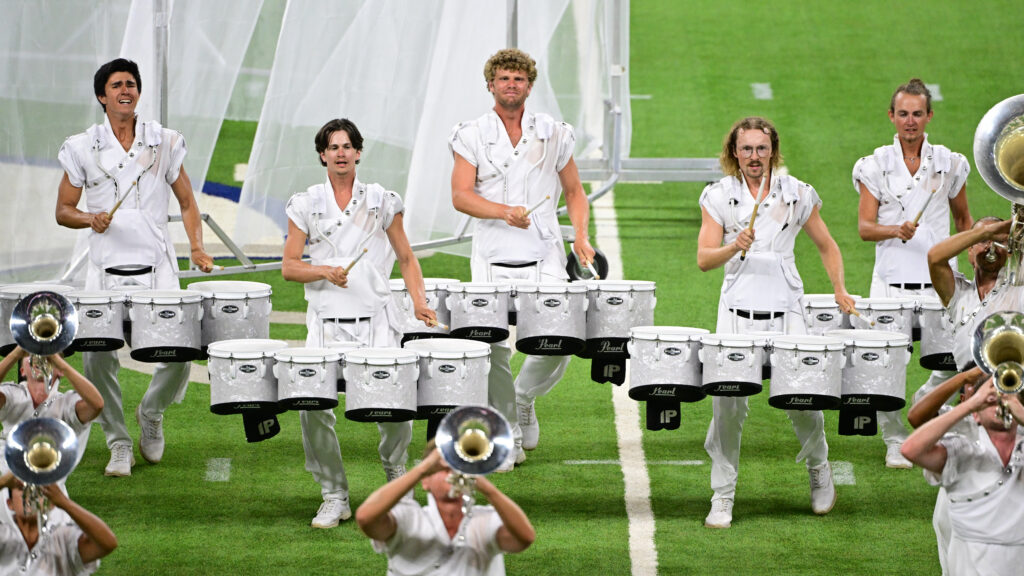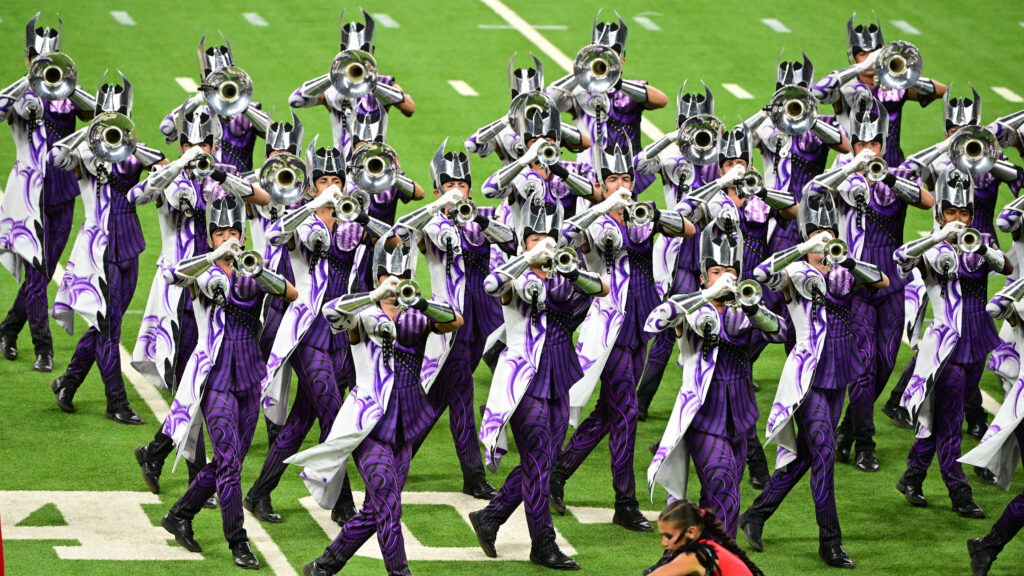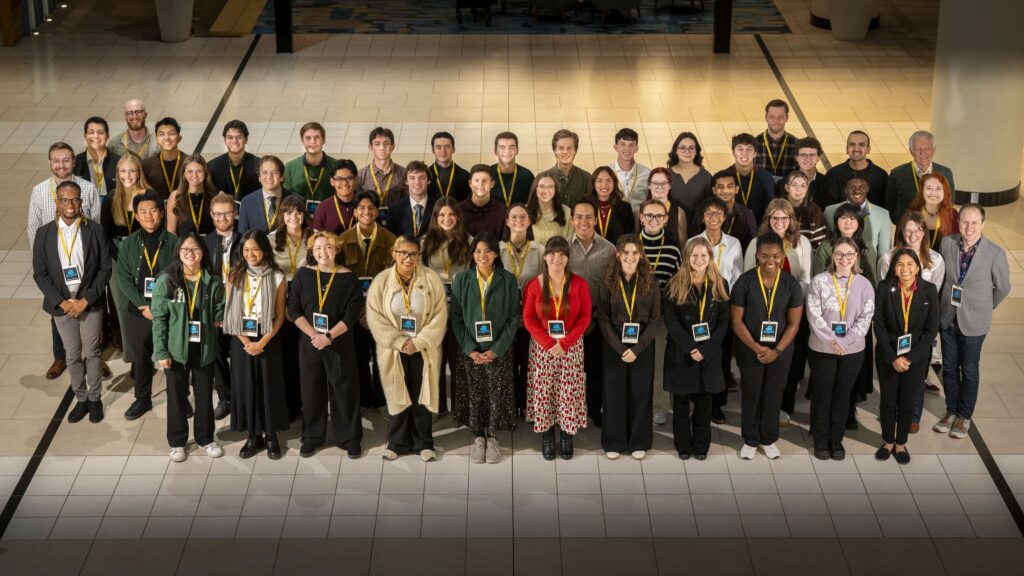Fifty years ago this past week, Gene Roddenberry’s “Star Trek” television series premiered on NBC, “to boldly go where no man has gone before.”
Set in the future on the USS Enterprise, 250 years from now, the 79 shows in the series made William Shatner’s Captain Kirk and Leonard Nimoy’s Spock characters quite famous; this despite the original series never really taking off ratings-wise. However, the fans of the show were (and still are) highly dedicated, and have kept the memory of the series alive through well-attended conventions and other media events.
Music from the original “Star Trek” television series—and also from later soundtracks in a long list of feature films—has found its way to the drum corps field.
In 1977, eight years after the “Star Trek” series had been in syndication and “People” magazine declared that the show “threatens to rerun until the universe crawls back into its little black hole,” the Garfield Cadets became the first to perform the theme from the original “Star Trek” television series in a Drum Corps International competition.
The well-known opening and closing theme composed by Alexander Courage was prominently performed by a number of artists, including jazz trumpeter Maynard Ferguson, who recorded it for his 1977 album, “Conquistador.”

Courage mostly worked as an orchestrator of film scores written by other composers. His work can be heard in a number of films scored by André Previn, Jerry Goldsmith, and John Williams, including “My Fair Lady,” “The Mummy,” “Fiddler on the Roof,” and “Jurassic Park.” He soured on writing for television, however, when Roddenberry wrote lyrics for the “Star Trek” theme. Those lyrics were never intended to be performed, but were written so Roddenberry could claim half the credits, and consequently, half the royalties from whenever the theme was performed.
The Cadets’ 1977 production is perhaps best remembered for the color guard members playing bugles in the closer and the entire corps singing “Amen” at the end of “I Don’t Know How to Love Him” from “Jesus Christ Superstar,” the mixed bag of musical selections and themes typical to drum corps productions of the time period.
In 1980, the Oakland Crusaders performed the new “Star Trek” theme written by famed American composer Jerry Goldsmith for the 1979 production, “Star Trek: The Motion Picture.” This was the first in a long series of “Star Trek” films and was approved for production due to the popularity of the original series in television syndication, and also the stunning success of another science fiction movie, “Closer Encounters of the Third Kind.” (At the time, Hollywood executives thought the success of the first “Star Wars” film was an anomaly.)
1980 was Oakland Crusaders’ sixth and final season prior to a five-year period of inactivity, after which the corps came back in DCI’s Division II & III. Valley Fever also performed this selection during 1981, the corps’ second of six seasons, and Blue Devils C also performed it in 2000 as part of a production made up entirely of popular television themes.
In just the corps’ second season of competition in 1983, the Vanguard Cadets brought to the football field James Horner’s “Battle in the Mutara Nebula” from “Star Trek II: The Wrath of Khan,” released the previous year as a sequel to “Star Trek: The Motion Picture.” The film set a world record for first-day box office gross and received more favorable reviews than its predecessor. Vanguard Cadets came back to the franchise with the theme from the 1986 film, “Star Trek IV: The Voyage Home,” written by Leonard Rosenman, who had composed music to “The Fantastic Voyage,” “The Lord of the Rings,” and two sequels to “Planet of the Apes.”

It wouldn’t be until 1993, however, that a corps would dedicate the majority of its production to the music of “Star Trek.” Blue Knights’ 10th-place “The Next Generation—Musical Selections from Star Trek” included the original television theme and the same James Horner work Vanguard Cadets had performed 10 years earlier.
Most of the show was given to Cliff Eidelman’s dark choral score for the 1991 film, “Star Trek VI: The Undiscovered Country.” This film holds a special place in the hearts of “Star Trek” fans, as it was the last production in which the cast of the original movie appeared together. Eidelman was only 26-years-old when he got the gig to compose the movie’s soundtrack.
Early in the show, Blue Knights performed Eidelman’s “Clear All Moorings” from the film, the work focusing on the wonder of a vast and wide-open outer space. The selection featured a drill formation of the arrowhead/rocket-shaped Starfleet insignia. Later in the show, a suite combined a few other works from the film, referencing the good guys prevailing against those who would do harm.
For 1996, the last season of the original Velvet Knights, the corps returned to its “Magical Mystery Tour” concept of 1987, 1988, and 1992. “Magical Mystery Tour in Space” included Jerry Goldsmith’s “Ilia’s Theme” from “Star Trek: The Motion Picture,” performed in the overture that preceded the film itself.

In 2008, San Antonio-based Open Class corps Revolution performed Jerry Goldsmith’s “Star Trek: First Contact,” from the 1996 movie that was the eighth in the series of “Star Trek” feature films. The movie was the second feature to star the cast of the television series, “Star Trek: The Next Generation,” which ran from 1987 to 1994.
In 2015, during “Intergalactic,” the Seattle Cascades brought back Alexander Courage’s theme from the original “Star Trek” television series to play up the production’s outer space theme.
Also as part of that 2015 production, the Cascades performed a work that was previously played by 7th Regiment in 2012 and the Cavaliers in its “Secret Society” show of 2013, “Enterprising Young Men.” The piece came from composer Michael Giacchino’s score to the 2009 film, “Star Trek.”
In the film, “Enterprising Young Men” served as the introduction of the USS Enterprise. The film was directed by J.J. Abrams, who also worked on “Star Trek Into Darkness” from 2013 and last year’s smash hit, “Star Wars: Episode VII – The Force Awakens.” The 2009 film was the 11th in the “Star Trek” film franchise and was a reboot of the main characters from the original “Star Trek” television series, but performed with an all-new cast.
It is probably a safe bet that in another 50 years, there will be a centenary celebration of the original “Star Trek” television series. And in all likelihood, during the intervening time, more corps will “live long and prosper,” performing music from “Star Trek” films and television series yet to be conceived.





